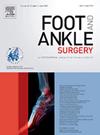Surgical management of severe planovalgus foot deformity in children with generalised joint hypermobility
IF 1.9
3区 医学
Q2 ORTHOPEDICS
引用次数: 0
Abstract
Background
This study aimed to evaluate the outcomes of calcaneal lengthening osteotomy (CLO) and double arthrodesis of the talonavicular and calcaneocuboid joints (DA) for correcting planovalgus foot deformity exclusively in patients with generalised joint hypermobility.
Methods
We retrospectively reviewed 29 feet in 17 consecutive patients who underwent either CLO or DA. The mean age at surgery was 11.3 ± 2.3 years, and the mean follow-up duration was 7.7 ± 3.2 years. Preoperative and final follow-up radiographs and dynamic foot-pressure measurements were analysed.
Results
Both operations significantly improved the radiographic parameters, except for the lateral talocalcaneal angle in the CLO group. Pedobarographic study demonstrated an elevation of the medial longitudinal arch and an improved foot-pressure distribution after both surgeries. The plantar pressure in the lateral forefoot significantly increased only in the DA group, while the pressures exerted on the medial forefoot and hindfoot and the arch index improved only in the CLO group.
Conclusions
Both CLO and DA effectively improve the foot alignments of the deformity in patients with generalised joint hypermobility. However, differences were observed in the changes in the lateral talocalcaneal angle and plantar pressure distribution between the two procedures.
Level of evidence
Therapeutic Level III.
对患有全身关节活动过度症的儿童的严重足平面外翻畸形进行手术治疗。
背景:本研究旨在评估小腿骨延长截骨术(CLO)和距骨关节和小方块关节双关节置换术(DA)的疗效,以矫正仅适用于全身关节活动过度患者的足平面外翻畸形:我们对连续接受 CLO 或 DA 手术的 17 名患者的 29 只脚进行了回顾性研究。手术时的平均年龄为(11.3 ± 2.3)岁,平均随访时间为(7.7 ± 3.2)年。对术前和最终随访的X光片和动态足底压力测量结果进行了分析:结果:除CLO组的距骨外侧角外,两种手术都明显改善了影像学参数。足底照相研究显示,两种手术后内侧纵弓都有所抬高,足底压力分布也有所改善。只有DA组前足外侧的足底压力明显增加,而只有CLO组前足内侧和后足的压力以及足弓指数有所改善:结论:CLO和DA都能有效改善全身关节过度活动症患者的足部排列畸形。结论:CLO和DA都能有效改善全身关节活动过度症患者的足部排列畸形,但两种治疗方法在足距角外侧的变化和足底压力分布方面存在差异:证据等级:治疗 III 级。
本文章由计算机程序翻译,如有差异,请以英文原文为准。
求助全文
约1分钟内获得全文
求助全文
来源期刊

Foot and Ankle Surgery
ORTHOPEDICS-
CiteScore
4.60
自引率
16.00%
发文量
202
期刊介绍:
Foot and Ankle Surgery is essential reading for everyone interested in the foot and ankle and its disorders. The approach is broad and includes all aspects of the subject from basic science to clinical management. Problems of both children and adults are included, as is trauma and chronic disease. Foot and Ankle Surgery is the official journal of European Foot and Ankle Society.
The aims of this journal are to promote the art and science of ankle and foot surgery, to publish peer-reviewed research articles, to provide regular reviews by acknowledged experts on common problems, and to provide a forum for discussion with letters to the Editors. Reviews of books are also published. Papers are invited for possible publication in Foot and Ankle Surgery on the understanding that the material has not been published elsewhere or accepted for publication in another journal and does not infringe prior copyright.
 求助内容:
求助内容: 应助结果提醒方式:
应助结果提醒方式:


